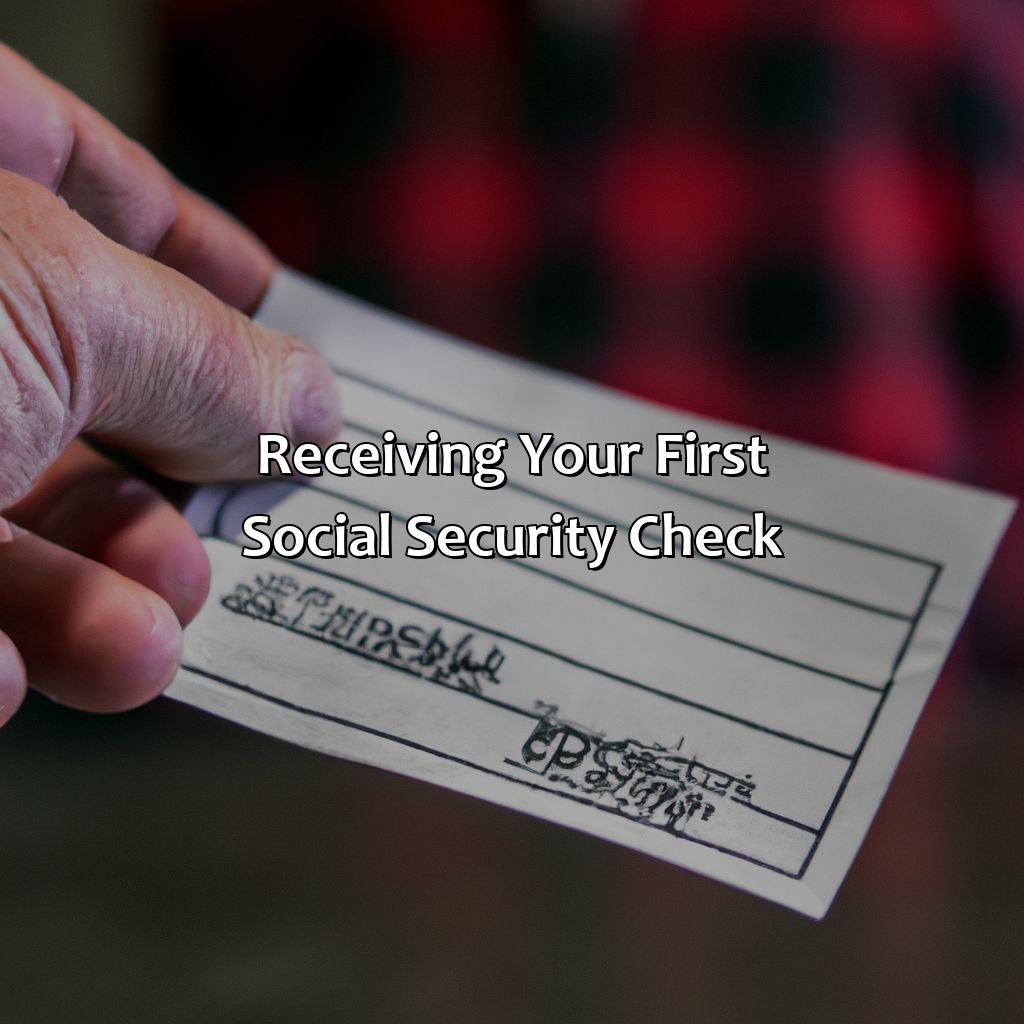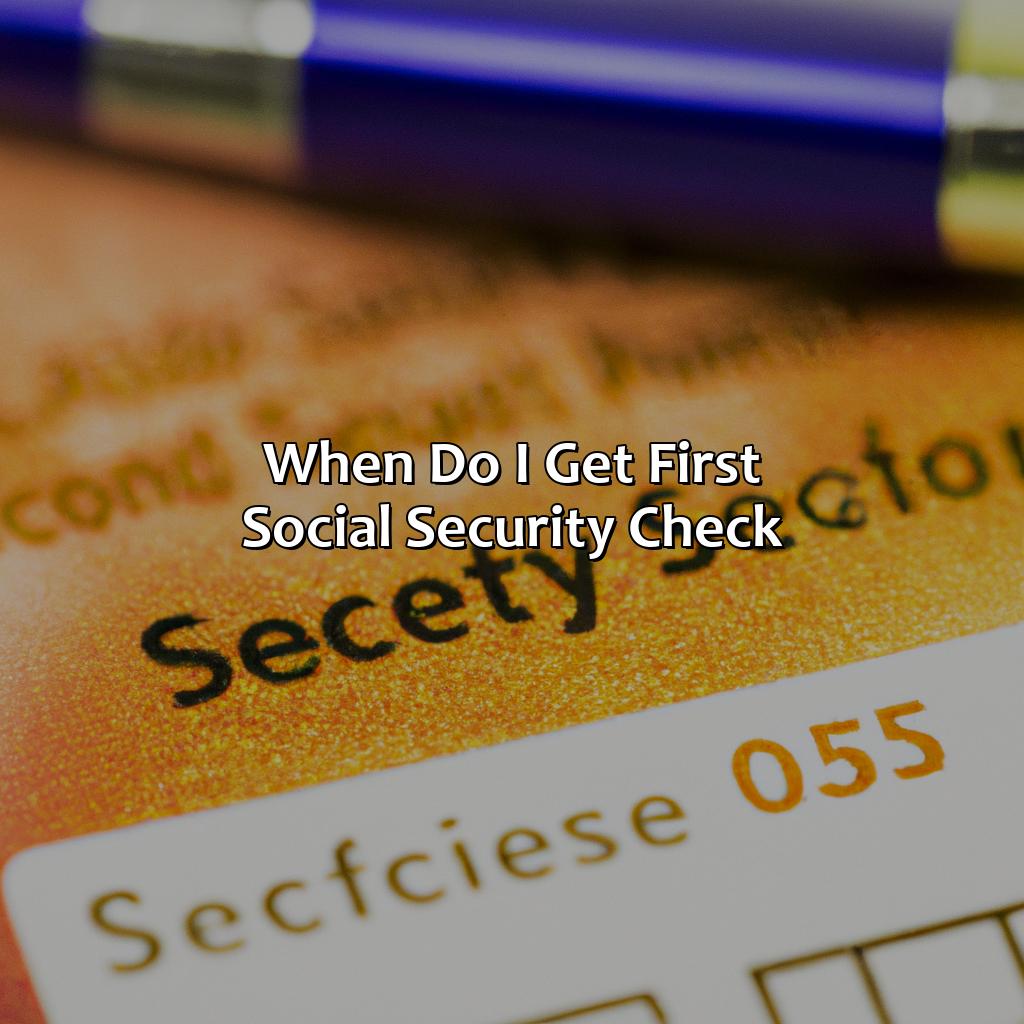When Do I Get First Social Security Check?
Key Takeaway:
- Eligibility for Social Security Benefits: To be eligible for Social Security benefits, you must have earned a certain number of credits based on your age and earnings. You must also be at least 62 years old and have retired or have a disability that prevents you from working.
- Applying for Social Security Benefits: You can apply for Social Security benefits online, over the phone, or in person. You will need to provide documentation such as your Social Security number, birth certificate, and tax returns.
- Receiving Your First Social Security Check: Your first Social Security check will be sent to you based on your date of birth and the date on which you applied for benefits. Factors such as your average indexed monthly earnings and whether you chose to receive early or delayed benefits will also affect the amount of your check. You can choose to receive your benefits through direct deposit or a prepaid debit card.
Have you been wondering when you will receive your first Social Security check? Let us shed some light on this, so you don’t have to worry any longer! You will discover how timing and eligibility are determined in this article.
Eligibility for Social Security Benefits
It is important to understand the criteria for receiving Social Security Benefits. Eligibility is determined by a person’s work history and age, with a minimum of 10 years of work experience required for eligibility. The amount a person receives is based on their earnings history, with adjustments made for inflation. In addition, there are certain special circumstances, such as disability, that may impact eligibility and payment amounts. It is advisable to consult with a Social Security representative for individualized information.
Pro Tip: Apply for benefits three months in advance to ensure timely receipt.

Image credits: retiregenz.com by Yuval Woodhock
Applying for Social Security Benefits
Do you need to apply for Social Security benefits? We’ve got you covered! To make it easier, we’ve broken down the steps you need to take in the section “Applying for Social Security Benefits”. We’ll discuss what documentation is necessary and the filing options available to help you get through the application process with ease.

Image credits: retiregenz.com by James Jones
Required Documentation
To ensure that you receive your social security benefits, you must provide the appropriate documentation in a timely manner. The required documentation includes proof of age, citizenship status, and work history. Additionally, you will need to show evidence of any marriages or divorces.
- Proof of Age – Birth Certificate or Passport
- Citizenship Status – Social Security Card or Green Card
- Work History – W2 Forms or Tax Returns
- Marriage/Divorce Records – Marriage/Dissolution Certificates
It is important to note that specific circumstances may affect the required documentation. For example, if you are a widow(er), you might need additional information such as a marriage certificate and proof of death for your spouse.
A true story illustrates the importance of providing accurate documentation. A man applied for social security benefits but was denied because he had listed an incorrect birth date on his application. It turned out that he was born in a different year than what he had thought for his entire life! After providing the correct proof of age, he was approved for benefits at last.
File online, because waiting in line is so last season.
Filing Options
Social Security Benefits can be applied for through a variety of channels, including online, in person, and over the phone. These different filing options provide flexibility for individuals to apply in a way that is convenient for them. The process of applying typically involves providing personal information and supporting documentation to the Social Security Administration.
It’s essential to note that the length of time it takes to receive the first social security check after applying varies depending on several factors, including how quickly information is processed and verified. For individuals who choose to apply online or over the phone, payments tend to be processed more quickly than those who choose to apply in person due to additional verification steps required.
Beyond the filing options themselves, there are other considerations that applicants should keep in mind when making their selection. For example, applicants may opt for an appointment-based process if they prefer more personalized guidance through their application journey.
Many individuals have found success with online applications as they allow applicants greater scheduling flexibility and immediate feedback on application status. This approach aligns with the Social Security Administration’s goal of making it easier and more accessible for individuals to apply for benefits.
One true story highlights the importance of choosing the right channel when applying for Social Security Benefits: A senior citizen struggled with medical issues that made traveling challenging but opted for an in-person application nonetheless. As a result, the applicant faced many difficulties during this process, which could have been prevented if they had used other channels available like phone or online application.
Don’t count your social security checks before they hatch, but do count on a lot of paperwork and waiting.
Receiving Your First Social Security Check
Receive your first social security check with ease! Discover payment dates. Consider factors that affect the amount. Investigate tax implications. Check out direct deposit or payment options.

Image credits: retiregenz.com by Yuval Washington
Payment Dates
Social Security Payment Dates Explained
Expect your first social security payment at the start of the month following your eligibility period. For example, if you qualify in January, expect the first payment to arrive in February. Payments will continue on a monthly basis thereafter.
The exact payment date is determined by your birthdate and the digit value assigned to you by the Social Security Administration. Be advised that payments can be affected by holiday schedules and weekend timing.
It’s worth noting that initial payments may take longer to process than subsequent payments, so be patient and plan accordingly for bills and expenses.
A colleague recently retired at age 67 and received confirmation of their eligibility for social security benefits. They were pleasantly surprised to receive their first payment ahead of schedule, only 25 days after they filed paperwork with the SSA.
“Why get a raise when you can just turn 65 and see your Social Security payment increase without even asking?”
Factors That Affect Payment Amount
The amount of your first Social Security check is impacted by various factors. These factors play a crucial role in determining the amount you receive each month.
- Your lifetime earnings can affect the payment amount.
- The age at which you start receiving benefits can impact the payment amount.
- How long you worked before retiring affects it, too.
- If you have dependents and when they begin to collect Social Security also influences your benefits.
- Your overall financial situation, including other sources of income, may impact your payments as well.
Looking at other criteria for Social Security payments, the cost-of-living adjustment (COLA) may increase annual adjustments to your benefit payment. One can also opt to delay receiving their first benefit payment until a later age, which could offer higher lifetime benefits.
Pro Tip: Understand how withholding works so that the right federal taxes are deducted from each check.
Congratulations on receiving your first social security check! Now get ready for the not-so-fun part: tax implications.
Tax Implications
Social Security Benefits and Tax Obligations
Social Security benefits are subject to federal taxation based on an individual’s income level. The taxable amount varies from zero to 85%, depending on the total income of the beneficiary. Eligibility for additional tax credits or deductions may also be impacted by Social Security benefits, so it is essential to understand one’s tax obligations.
To determine if Social Security benefits are taxable, individuals must add their adjusted gross income, non-taxable interest, and half of their Social Security benefit amount together. For single taxpayers with a combined income of $25,000 to $34,000 and joint filers with a combined income of $32,000 to $44,000, up 50% of Social Security benefits may be taxed. Additionally, for those who have incomes exceeding these amounts or fall under specific circumstances as outlined by the IRS publication 915 they may need to pay taxes as high as 85%.
It is essential for beneficiaries receiving Social Security checks to report the correct amount on their tax returns each year and plan accordingly for potential tax bills based on these reported payments during each previous year.
Finally, working while receiving social security can also have an impact on one’s tax obligations. If someone continues to work past their Full Retirement Age (FRA) while receiving Social Security retirement benefits before reaching FRA age status – which is about 67 years old in most cases – they might owe more in taxes than expected due to employment wages added into their SSA retirement benefit calculations. It’s therefore necessary for recipients of social security to consult a financial planner or accountant who specializes in taxes so that they can accurately project out what they’ll owe over time given any changes happening in both earned incomes and their job status when factoring social security payouts into this equation.
Direct Deposit and Payment Options
Directly receiving payments for Social Security requires one to set up a payment option.
- The most favorable payment option is Direct Deposit because it is more secure, convenient, and reliable than paper checks.
- Individuals can select a Direct Express card which is a pre-paid debit card that receives monthly payments from Social Security.
- One can use the Electronic Transfer Account program; this program accepts types of federal benefits and provides an account with low fees for individuals with lower incomes.
- An additional alternative would be to opt for receiving payments through a bank or credit union as it provides online access to funds and reduces transactional fees.
When opting to choose Direct Deposit, ensure the bank information provided to the Social Security Administration is correct. This will allow hassle-free transitions in deposits monthly.
Pro Tip: Double-check your bank and routing number before submitting them. Any error could lead to possible delays in receiving benefits.
Five Facts About “When Do I Get My First Social Security Check?”:
- ✅ Generally, you’ll receive your first Social Security check about three to four weeks after you submit your application. (Source: SSA)
- ✅ There is a five-month waiting period before you can begin receiving Social Security disability benefits. (Source: SSA)
- ✅ If you sign up for Social Security benefits before your full retirement age, your monthly benefit amount will be reduced. (Source: SSA)
- ✅ The full retirement age for Social Security benefits varies depending on your birth year, but it ranges between 66 and 67. (Source: SSA)
- ✅ Social Security benefits are paid out on a monthly basis, usually on the second, third, or fourth Wednesday of each month. (Source: SSA)
FAQs about When Do I Get First Social Security Check?
When do I get my first social security check?
Generally, your first social security check will arrive in the month after you reach your full retirement age. If you were born between 1943 and 1954, your full retirement age is 66.
Can I get my social security check earlier?
You can start receiving your social security benefits as early as age 62. However, your benefit amount will be reduced if you start receiving benefits before your full retirement age.
How is my social security check amount calculated?
Your social security check amount is calculated based on your highest 35 years of earnings. However, the amount you receive can be impacted by early or delayed retirement, as well as other factors such as spousal benefits.
How will I receive my social security check?
You can choose to receive your social security benefits either by direct deposit into your bank account or by paper check mailed to your home address.
What happens if I don’t receive my social security check?
If you don’t receive your social security check on the expected date, you should first contact your bank to make sure there are no issues with your direct deposit. If you still have not received your check, contact the Social Security Administration to report the issue and request a replacement check.
Can my social security check be garnished?
In certain circumstances, such as owing back taxes, your social security check can be garnished. However, there are limits to how much can be taken from your benefit amount. Also, your social security benefits cannot be garnished for most types of debt, such as credit card debt or medical bills.
